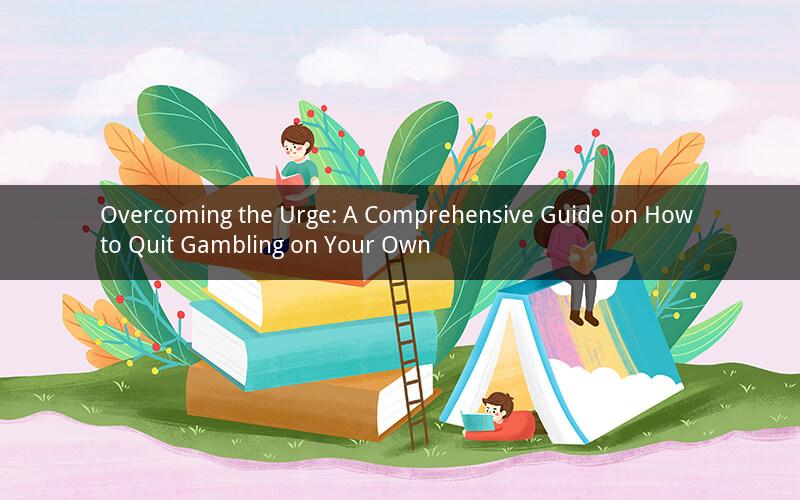
Introduction:
Gambling has become a prevalent issue in today's society, affecting individuals from all walks of life. Many people struggle with the urge to gamble, often leading to financial, emotional, and social consequences. If you find yourself in a similar situation and are determined to quit gambling on your own, this guide will provide you with valuable insights and strategies to help you overcome this addiction.
1. Understanding the Problem:
To effectively quit gambling, it is crucial to acknowledge and understand the problem. Begin by reflecting on the following questions:
What triggers your urge to gamble?
How does gambling affect your life?
What are the consequences of your gambling behavior?
By addressing these questions, you can gain a clearer perspective on the extent of your addiction and its impact on your life.
2. Recognizing the Signs of Problem Gambling:
Identifying the signs of problem gambling is essential in recognizing when you need to take action. Some common signs include:
Increased time spent on gambling activities
Neglecting responsibilities and relationships
Financial difficulties
Feelings of guilt, anxiety, or depression
Attempts to stop gambling without success
By recognizing these signs, you can take immediate steps to address your gambling addiction.
3. Setting Clear Goals:
Setting clear and achievable goals is crucial for successfully quitting gambling. Consider the following:
Define your reasons for quitting gambling.
Establish specific, measurable, achievable, relevant, and time-bound (SMART) goals.
Seek support from friends, family, or a professional therapist.
Remember, goals should be realistic and tailored to your individual needs.
4. Developing a Support System:
A strong support system can significantly enhance your chances of quitting gambling. Here are some ways to build a support network:
Seek out support groups, such as Gamblers Anonymous or online forums.
Connect with friends and family who understand your struggle and offer support.
Consider hiring a therapist specializing in gambling addiction.
5. Identifying and Avoiding Triggers:
Identifying and avoiding triggers is essential to prevent relapse. Consider the following:
Keep a journal to track your triggers and note how they affect your urge to gamble.
Create a list of activities and hobbies that can replace gambling.
Avoid places or situations that may trigger your urge to gamble.
6. Developing Coping Strategies:
Developing effective coping strategies can help you manage cravings and reduce the urge to gamble. Some strategies include:
Practice relaxation techniques, such as deep breathing, meditation, or yoga.
Engage in physical exercise to release endorphins and improve your mood.
Seek professional help, such as therapy or counseling, to address underlying issues contributing to your gambling addiction.
7. Creating a Reward System:
Establishing a reward system can provide motivation and encourage you to stay on track. Consider the following:
Set milestones and celebrate your achievements.
Reward yourself with non-gambling-related activities or treats.
Stay accountable to your goals and track your progress.
8. Staying Committed:
Quitting gambling is a challenging process that requires dedication and commitment. Here are some tips to help you stay committed:
Remind yourself of the reasons why you want to quit gambling.
Stay focused on your goals and visualize the positive outcomes.
Seek inspiration from others who have successfully overcome gambling addiction.
Conclusion:
Quitting gambling on your own is possible with the right mindset, strategies, and support. By understanding the problem, recognizing the signs, setting clear goals, building a support system, identifying and avoiding triggers, developing coping strategies, creating a reward system, and staying committed, you can overcome your gambling addiction and lead a healthier, more fulfilling life.
Frequently Asked Questions:
1. How long does it take to quit gambling?
The duration of quitting gambling varies from person to person. Some may experience immediate success, while others may require several months or even years to overcome their addiction.
2. Can I quit gambling without seeking professional help?
While it is possible to quit gambling on your own, seeking professional help can significantly increase your chances of success. A therapist or counselor can provide personalized guidance and support throughout your journey.
3. Will I always have the urge to gamble?
Yes, it is normal to experience cravings or the urge to gamble, even after overcoming the addiction. However, with the right coping strategies and support, you can manage these urges and prevent relapse.
4. Can gambling addiction be cured?
Gambling addiction is a chronic condition, but it can be managed effectively. With proper treatment and support, individuals can learn to live a fulfilling life without the urge to gamble.
5. How can I stay motivated to quit gambling?
Staying motivated to quit gambling involves setting clear goals, celebrating your achievements, and seeking inspiration from others who have successfully overcome their addiction. Remembering the reasons why you want to quit and visualizing the positive outcomes can also help keep you motivated.